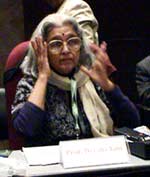Press Release
Reproductive Health and Women's Rights are Key Issues for Sustainable Development Summit
27 August 2002
Press Release
27 August 2002
Johannesburg--Reproductive health and women's rights are critical to alleviating poverty and the World Summit on Sustainable Development (WSSD) should say so, speakers at a summit panel discussion stressed today.

Parliamentarians from the United Kingdom and Japan, South African Minister of Finance Trevor Manuel, Indian economist Devaki Jain, United Nations Foundation President Timothy Wirth and Kunio Waki, Deputy Executive Director (Programme) of UNFPA (the United Nations Population Fund) spoke on the topic "Population in Sustainable Development, Reproductive Health and Gender in Poverty Reduction".
Some 200 WSSD participants including several government ministers attended the event, hosted by UNFPA, the Government of South Africa, the UK All-Party Parliamentary Group on Population and Development and Reproductive Health, and the Inter-European Parliamentary Forum on Population and Development.
Christine McCafferty, a Member of Parliament and Chairperson of the UK All-Party Parliamentary Group led the discussion. She noted that inattention to women's health takes a terrible toll in developing countries, including half a million deaths during pregnancy and childbirth each year, and limits women's participation in development. She called on the WSSD to reaffirm the commitment made in Cairo at the1994 International Conference on Population and Development (ICPD) to ensure universal access to reproductive health services by 2015.
Finance Minister Manuel emphasized the enormous gap between living standards of rich and poor, exacerbated by widespread unemployment, a lack of resources for education and health care, and unfair trade policies. "We cannot tackle poverty without open markets," he said.
Yoshio Yatshu, Chairman of the Asian Forum of Parliamentarians on Population and Development, pointed out that rapid population growth is one reason that 80 countries have a lower per capita income today than 10 years ago at the time of the Earth Summit was held in Rio de Janeiro. "We must slow population growth by stressing reproductive health and rights and the empowerment of women. It is imperative that WSSD delegates recognize this," he stated.
A new approach to development that empowers the poor to be agents of change is needed, Ms. Jain argued. She contended that "the poor have the capacity to generate demand and economic growth." Poor women do not want to have many children, she added, but lack the capacity to say no. "It is a matter of power."
Mr. Waki of UNFPA reiterated the point he made Monday in the first of five of partnership plenaries on the summit's five major themes, health, biodiversity, water, energy and agricultural productivity: reproductive health and equality for women are essential to sustainable development. "Gender must be given more importance" in WSSD deliberations," he said.
"The momentum of Cairo has been reversed and must be turned back around," said Mr. Wirth of the United Nations Foundation. "Northern consumption is still growing; reproductive health and women's empowerment are still neglected," he said. This undermines prospects for alleviating poverty and reversing environmental problems.
A number of audience members joined the ensuing discussion. Michael Meacher, the United Kingdom's Minister of State (Environment), said his Government is committed to the ICPD agreement. "If you want sustainable development, poverty reduction and stabilization of world population growth, then investment in health, particularly reproductive health, is absolutely critical. This is a very important issue for this summit."
Uganda's Minister of Gender, Labour and Social Development said that since the ICPD, her country had benefited from UNFPA's support for reproductive health. She herself had been trained as a traditional birth attendant under this programme.
A university professor from the United Kingdom said, "the pill and the condom are symbols of environmentalism just as much as the bicycle and the windmill".
"The road from Rio to Johannesburg must pass thru Cairo. This has not happened," said Mahendra Shah of the Global Science Panel on Science and Development. A number of speakers supported his call for the WSSD to include a strong reference to population in the Political Declaration the summit is expected to adopt next week.
Contact Information:
William A. Ryan
Tel.: +66 2 288 2446
Email: ryanw@unfpa.org
Kristin Hetle
Tel.: +1 212-297-5020
Email: hetle@unfpa.org